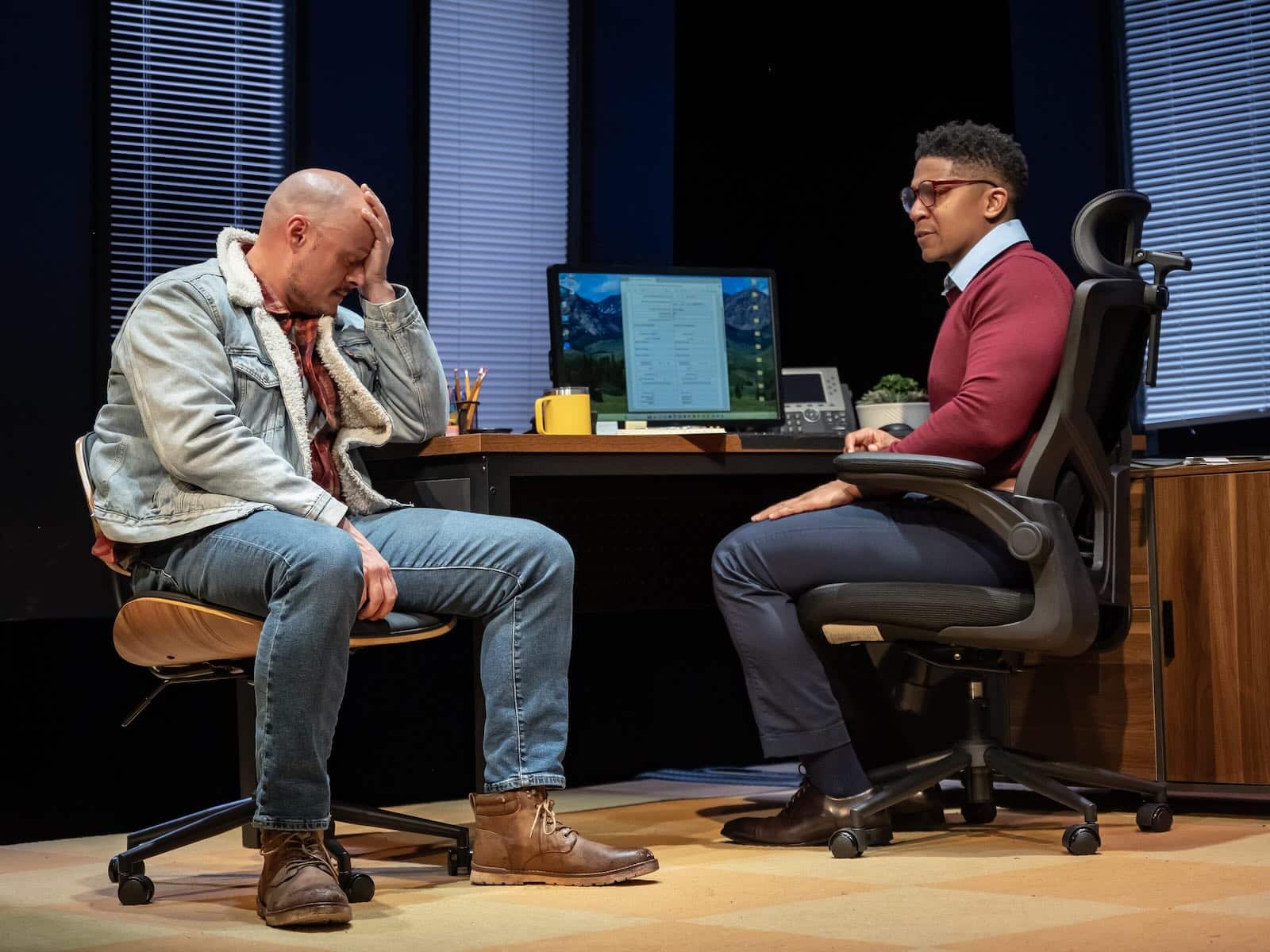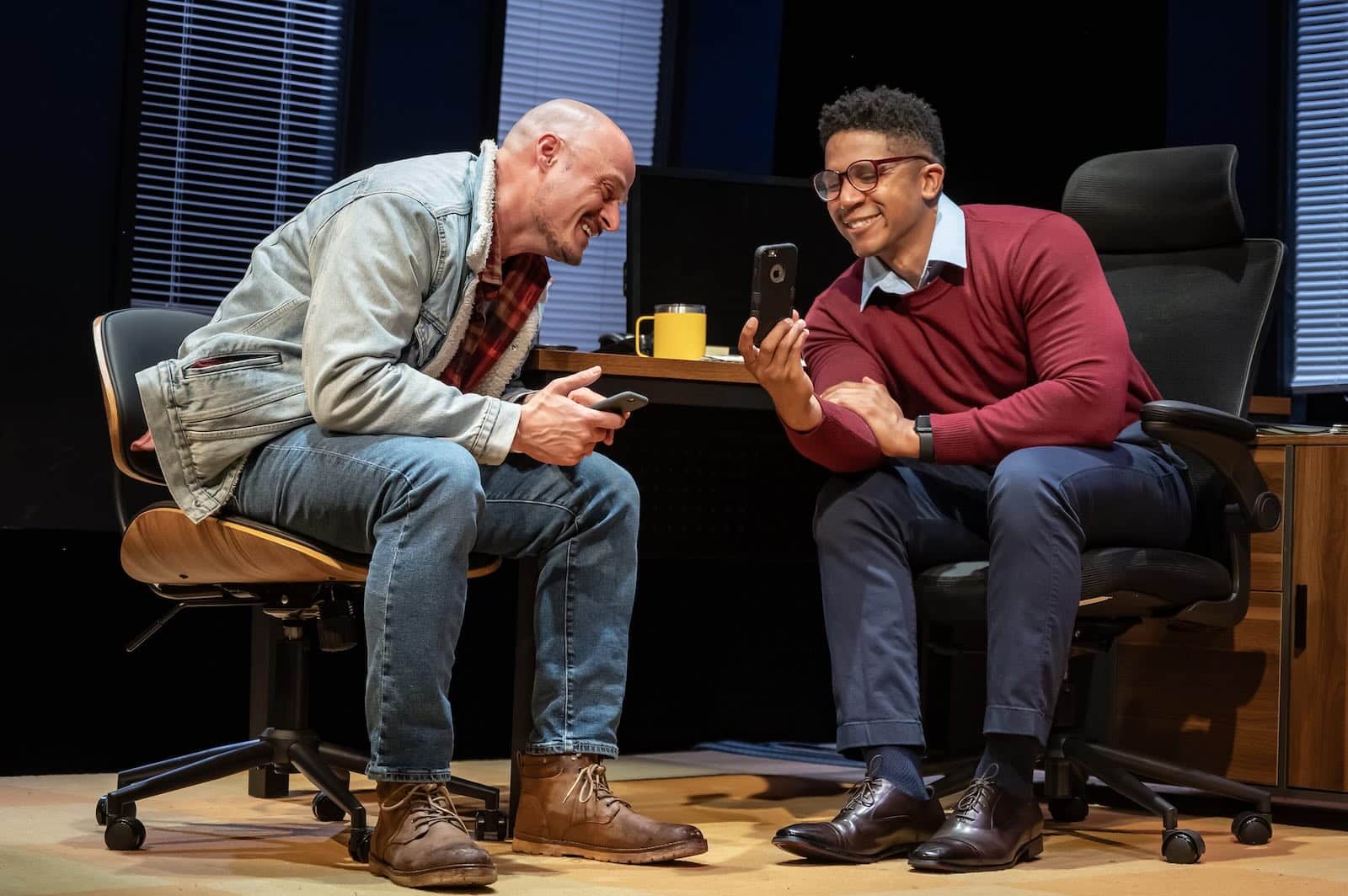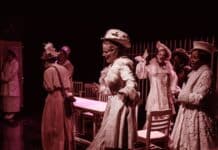Adult men do not readily form bonds of platonic love and trust with each other, much less across societal divisions of race, economic disparity, and sexual-orientation difference. In many a man’s mind, that’s just not what dudes do. If they meet, it’s to compete or defeat, never to care and connect.
The rarity of unabashed male-male rapport is cast into sharp relief by Samuel D. Hunter’s heart-wrenching two-hander, A Case for the Existence of God, now playing at Mosaic Theater in an astonishing and moving production directed with consummate sensitivity by Danilo Gambini.
To be clear, the name of Hunter’s play is a misnomer. There is nary a theological reference nor a tinge of spirituality talk in it. Instead, the engrossing story Hunter’s pitch-perfect script tells is about how and why a very down-to-earth, uncommon friendship grows between two men who are of the same age but in nearly every other respect starkly different: One, Ryan (Lee Osorio), is white, a dirt-poor factory worker, straight, and getting divorced by his wife. The other, Keith (Jaysen Wright), is Black, a comfortably middle-class mortgage broker, single, and gay. Their connection begins improbably when they meet at a day-care center where each takes his toddler daughter. They meet again, at what is the start of the play, in Keith’s sleekly neat home office, where Ryan has come in hopes of obtaining a loan to buy land on which to build a home for the daughter he hopes to hold on to.

There follows what seems on the surface a by-the-book talkathon about the mortgage application process, the ins and outs of interest rates, and such, with the better-educated Keith patiently trying to bring Ryan up to speed. As the play proceeds, however, we learn what’s really at stake for them both: Ryan is at risk of losing custody of his beloved daughter in a divorce proceeding; Keith, who is fostering to adopt, is at risk of losing his beloved daughter to her birth mother’s homophobic sister. Thus, as these two men tentatively discover through steadily intensifying self-disclosure, they share fears and sadness that they and we learn they are not alone in.
Osorio’s Ryan begins nervous, tense, and distressed, dressed in a plaid shirt, a denim jacket, and work boots; Wright’s Keith is cool, composed, and professional in a collar shirt, a preppy sweater, and fashionable shoes (the apt costumes are by Danielle Preston). Before long, any stereotyping of Ryan as bumpkin and Keith as snob is dispelled as not who they are at all.
Both actors have moments of sweet humor and extraordinary monologues of emotional self-disclosure, which they embody with such interior truthfulness that we are pulled steadily into their human hurt. When they share photos on their phones of their daughters, they share pure joy. Slowly and surely, their daughter-centered affinity becomes a reciprocal regard between them that could, in other contexts, surpass the connection of affection. Quite simply, the open-hearted performances of Lee Osorio and Jaysen Wright reveal on stage a dimension of two men beholding one another wholly that in less secular contexts could pass for beatitude.
Nadir Bey’s scenic design has Keith’s cubicle jutting angularly toward the audience, framed above and below by a brightly lit border that, in Colin K. Bill’s lighting design, modulates to mark the swift transitions between scenes. Props by Pauline Lamb include a computer, office supplies, and a baby monitor on Keith’s desk. Even as a few months pass, Ryan and Keith stay seated, wearing the same clothes, connecting more and more deeply, with greater and greater emotional transparency.

Throughout the unfolding of Ryan and Keith’s relationship, there runs an insistent theme of hope: Says Ryan at one point, “Maybe there’s good left in the world.” That said, nothing prepares us for the emotionality of the last-scene reveal: a brilliant coup de théâtre that will both break and lift your heart.
A Case for the Existence of God depicts a kind of open-heartedness that the world dearly needs. And on reflection, the title may not be a complete misnomer after all; it may just be misleadingly truncated. A more honest iteration would add two crucially truthful words: A Case for the Existence of God Between Us.
Running Time: Approximately one hour and 40 minutes, with no intermission.
A Case for the Existence of God plays through December 14, 2025, in the Sprenger Theatre at Atlas Performing Arts Center, 1333 H Street NE, Washington, DC. Performances are Thursdays–Saturdays at 7:30 p.m. (except November 27 and 28); Saturdays at 3 p.m.; Sundays at 3 p.m.; and Thursday, November 20 and December 4, at 11 a.m. Tickets ($50.50–$83.50) are available online or through the box office. The Box Office can be reached at (202) 399-7993 or boxoffice@atlasarts.org from 12PM–6PM Tuesday through Sunday, or one hour prior to a performance. Information about discounts is here. Tickets are also available through TodayTix.
The program is online here.
A Case for the Existence of God
By Samuel D. Hunter
Directed by Danilo Gambini
Lee Osorio as Ryan
Jaysen Wright as Kieth
Scenic Designer: Nadir Bey
Lighting Designer: Colin K. Bills
Costume Designer: Danielle Preston
Sound Designer: Sarah O’Halloran
Properties Designer: Pauline Lamb
Stage Manager: Shayna O’Neill
Dramaturg: Jacob Ettkin
Intimacy and Violence Director: Sierra Young
Casting Director: Chelsea Radigan
SEE ALSO:
Mosaic Theater to present DC premiere of ‘A Case for the Existence of God’ (news story, October 8, 2025)



